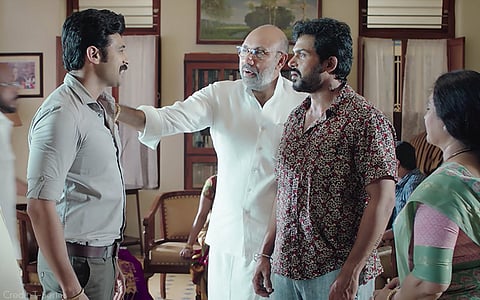
- Reviews
- Power List 2024
- Cannes 2024
- In-Depth Stories
- Web Stories
- News
- FC Lists
- Interviews
- Features
- FC SpecialsFC Specials

Jeethu Joseph opens Thambi with a god's-eye-view shot that looks upon four trucks, whose drivers are in some sort of argument (and some sort of shady deal). The camera zooms down, coming closer to earth, closer to those trucks and the people around them — and one of them, named Saravanan, gets hit on the head. It's all very fancy and it all seems to mean something — until it doesn't. By the end of the film, you realise there was no need for all this visual trickery. (Unless you just want to say: What a cool shot!) We needn't have seen those trucks or those people. It's a metaphor for the movie. Things keep happening and they seem to mean something — until they don't.
Now, you could argue that that's the very nature of a red herring. It's meant to divert our attention until the actual reveal makes us slap our foreheads and say: Oh my god's-eye-view! But the red herring has to fit into the overall design. Take the scene in the second half where a cop is shot dead. The killer doesn't seem the kind of guy who'd do such a thing. At one point, he is revealed as EVIL, someone who will eliminate everyone who gets in the way. But later, he comes across like the Mohanlal character in Drishyam, a GOOD man who's simply covering up for his family. Is he both? Thambi doesn't make a convincing case. Unlike in Drishyam, the convolutions here aren't organic. The narrative gears are lubricated with snake oil.
So on to the plot, set 15 years after the god's-eye-view incident, where Saravanan disappears. It's reminiscent of Le Retour de Martin Guerre (and its Hollywood remake Sommersby) and Anastasia (and its Tamil remake Adutha Varisu). Saravanan (Karthi) returns to the family. His parents (Sathyaraj, Seetha) are delighted. His older sister (Jyotika) won't talk to him, because she's still upset that he deserted them. His school-time crush (Nikhila Vimal) throws herself into his arms. Only his grandmother (Sowcar Janaki) seems to suspect that he's an impostor. None of these characters is written with the depth or the psychological nuance in Drishyam, where everyone behaved in a way the situations demanded. Here, everyone behaves like… a red herring. Every line of dialogue could be subtitled: "Gotcha!"
It's easy — actually, not so easy, but at least, it's the lesser of the evils — to ignore the badly shot songs, the badly staged action scenes, the badly executed tone shifts, or even the all-round badness of the performances. The director encourages everyone to mug madly — every reaction shot from Karthi is like a wink to the audience. But what else can the poor man do, when given impossible scenes like the ones that have him talking to his conscience in various mirrors? There's a huge subplot — so huge that it's probably wrong to call it a sub-plot — about a heartless corporation that wants to dislocate tribals and build a resort on their land. By the time the film ends, you'll be left wondering why so much time was devoted to something that ultimately means so little.
The twist itself isn't bad. (And the way Saravanan pieces things together, it does make some sense.) But it's quickly undone by another twist that, I admit, I did not expect at all — but when you think back about the emotions in the earlier portions, they don't exactly lead up to this second twist. People either accept Saravanan or suspect him. There is none of the tentativeness you expect under these circumstances, where someone might say: Okay, I want to believe him, but he's been away for so long and I need time to feel comfortable around him again.
Meanwhile, we have actors like Hareesh Peraadi playing characters that could be named I May Be The Bad Guy. I think Jeethu Joseph wanted to make a hard-edged emotional thriller about people who harbour secrets and lies, but decided to "soften" the characters and events and make them more mainstream-friendly. The result is a silly movie that thinks it's being oh-so-clever.